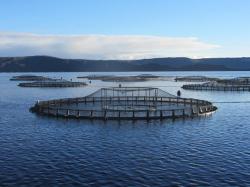First ASC Certified Australian Salmon Producer Brings More Responsible Salmon To Market
November 18, 2014 | 3 min to read

The Aquaculture Stewardship Council (ASC) congratulates Tasmanian salmon producer Tassal on achieving ASC certification for all of their salmon farming operations.
Tassal’s Macquarie Harbour Farm was awarded ASC certification back in April, making it the first fish farm in Australia to meet the ASC standard. Tassal then went on to complete their farm assessments in September, gaining certification for the last of their farms this week.
Head of Sustainability at Tassal, Linda Sams, said: “According to predictions Australia is expected to import over 1 million tonnes of seafood by 2020 – incredible considering the country’s potential to farm our own stocks locally. There is a clear opportunity here for local growth to meet the demand for responsibly produced salmon.
“We have invested a huge amount of time, resources and money into ensuring all of our sites not only reach, but exceed the standards set by the ASC; the global benchmark for responsible aquaculture.”
Bringing about real change
Tassal has worked closely in partnership with WWF since 2012 to develop their responsible aquaculture production to meet the requirements of the ASC Salmon Standard.
Over that time they have implemented significant upgrades. For example, improving their feed formulation to reduce the reliance on fish meal and fish oil; replacing the last of their copper treated nets; introducing a fish health department and fish welfare programme; and creating an ASC dashboard that publicly reports on any antibiotic use, wildlife interactions or unexplained fish loss.
ASC's CEO, Chris Ninnes, said: “I’d like to congratulate Tassal and its staff for their effort and commitment to achieving ASC certification for all of their farms. Their work and dedication will undoubtedly have a positive effect for the future of aquaculture in the region as it moves towards environmental sustainability and social responsibility.
"The market response since the launch of the ASC salmon standard has been remarkable. And, I’m delighted to see it expand in Australia.”
Independent third-party process
The Tassal farms’ certificates were awarded following assessment by SCS Global Services (SCS), an independent, accredited certification body.
ASC strives to have a fully transparent certification process. The announcement of the farm audit was publicly visible for at least 30 days before the actual audit. Once the farms had been assessed by SCS, the certifier produced the draft farm audit reports, which were published on ASC’s website for a minimum of 10 working days for comment.
The decision on whether or not the farm is awarded ASC certification is made by the certifier and is based on the last version of the report.
Demonstrating environmental and social responsibility
Farms certified to the ASC standard demonstrate that they use methods which minimise environmental impacts and that they care for their farm workers and the local communities. As a result, ASC certified farms deliver a cleaner seabed, cleaner water, healthier fish, preserve the diversity of species and wild population, follow strict feed requirements and ensure social responsibility.
For more information about the Tassal's commitment to ASC, please watch the following short film produced by WWF Australia: http://bit.ly/1upPwtP
About ASC
The Aquaculture Stewardship Council (ASC) is an independent, not-for-profit organisation founded by World Wildlife Fund (WWF) and The Sustainable Trade Initiative (IDH) in 2010 to manage the certification of responsible fish farming across the globe.
The ASC standards require farm performance to be measured against both environmental and social requirements. Certification is through an independent third party process and (draft) reports are uploaded to the public ASC website.
The on-pack ASC logo guarantees to consumers that the fish they purchase has been farmed with minimal impacts on the environment and on society.
The ASC standard addresses the following seven principles:
- Legal compliance (obeying the law, the legal right to be there)
- Preservation of the natural environment and biodiversity
- Preservation of the water resources and water quality
- Preservation of the diversity of species and wild populations (for example, minimising escapes that could become a threat to wild fish)
- Monitored and responsible use of animal feed and other resources
- Animal health (no unnecessary use of antibiotics and chemicals)
- Social responsibility (for example, no child labour, health and safety of employees, freedom of assembly, community relations).
For more information about ASC please visit www.asc-aqua.org
Source: The Aquaculture Stewardship Council (ASC)
